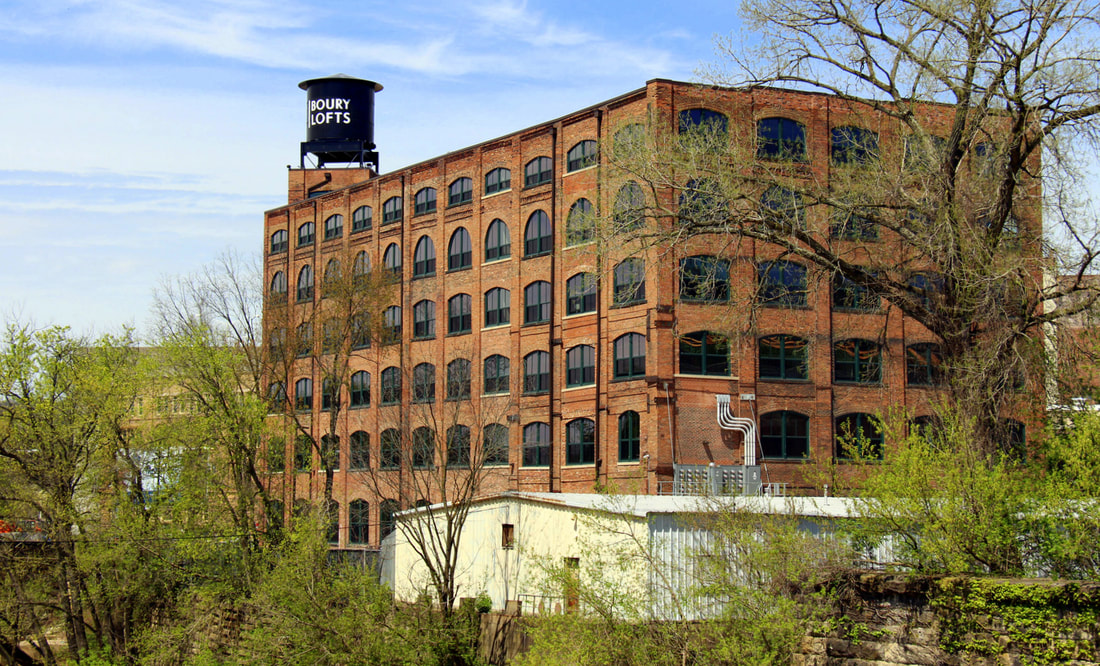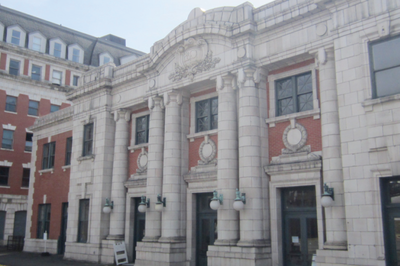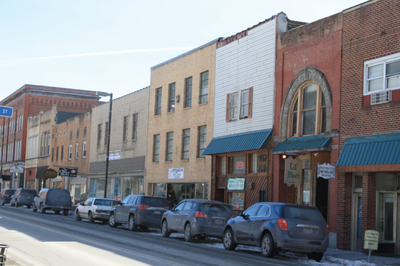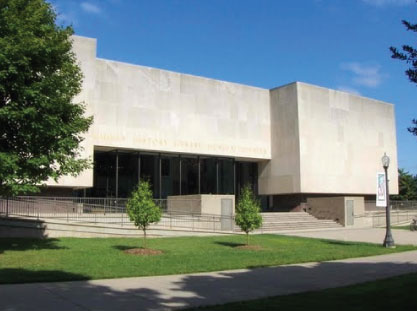|
On Friday, December 15, House and Senate conference committee members reached agreement on the details of major tax legislation that will now proceed to a final vote in both chambers this week. The agreed-upon version keeps the historic tax credit at 20 percent but requires that the credit be taken over five years instead of all at once. The legislation repeals the 10 percent rehabilitation tax credit for non-historic buildings, but it does retain the New Markets Tax Credit.
Inclusion of the historic tax credit in the most significant tax legislation to move through Congress in more than three decades is an exceptional reaffirmation that rehabilitation of historic buildings is sound federal policy and good for the nation. While several steps remain before the Tax Cuts and Jobs Act (H.R. 1) becomes law, please take a moment to reflect on what a significant accomplishment retention of the historic tax credit is for the preservation movement and for the betterment of our communities. With the recent increase in the state historic tax credit to 25%, West Virginians will have access to 45% in combined state and federal tax credits when undertaking construction on a historic income-producing property. The 25% increase takes effect on January 1, 2018. Thank you to the many preservationists, practitioners, and stakeholders who worked countless hours to ensure this critical preservation tool remains a pillar of federal historic preservation policy. Thank you to Congressmen McKinley and Jenkins for standing up to retain the historic tax credit and signing a Tax Credit letter focused on the Historic Tax Credit and New Markets Tax Credit. You can thank Congressman McKinley through his website at https://mckinley.house.gov/email-me/. He has been instrumental in leading the effort to save the historic tax credit. You can thank Congressman Jenkins through his website at evanjenkins.house.gov/contact/email.
2 Comments
Urgent Action Needed: Advocate for a 20% HTC in Final House/Senate Reconciled BillEarly on Saturday morning, the United States Senate passed its tax reform bill on a vote of 51-49, moving the legislation to a House and Senate Conference Committee to reconcile the two versions of tax reform. The Senate bill restores the 20% Historic Tax Credit (HTC) with a provision that it will be claimed over five years.
Your immediate ACTION is needed! All advocates should be fully activated across the country, connecting with both House and Senate offices. Call-to-Action: Call (during office hours) the offices of your Members of Congress. Ask to speak to tax staff, your staff contacts in offices or ask for email addresses of tax staff. Scroll down for contact information and suggested messages: 1. Introduce Yourself as a Constituent Contact info: McKinley, David - (R - WV, 1) (202) 225-4172 https://mckinley.house.gov/contact/ Suggested thank you: "I would like to thank the Congressman for his leadership during the tax reform bill and for his efforts to preserve the 20% Federal historic tax credit. We hope the Congressman will continue to fight for this important financial development tool during House and Senate conference committees related to the tax reform bill." Mooney, Alex - (R - WV, 2) (202) 225-2711 https://mooney.house.gov/contact Jenkins, Evan - (R - WV, 3) (202) 225-3452 Contact: https://evanjenkins.house.gov/contact Suggested Message to Congressmen Mooney & Jenkins: I am calling to request your help to ensure the existing federal historic tax credit (HTC) is retained through the tax reform process. The House tax reform bill repeals the HTC, but the Senate Finance Committee is proposing to keep the historic tax credit in place with certain reductions to the incentive. We need the HTC retained at its current level of effectiveness so that this proven tool can continue to restore under-utilized buildings, create local jobs and revitalize older commercial districts. 2. Explain why you value Historic Tax Credits, and that the redevelopment of historic buildings will not get done without the HTC. 3. Let them know some previous and future HTC projects in your state/district 4. Touch on why these historic buildings are so challenging but important to our communities. 5. If your Member of Congress has agreed to help, please remember to thank them and tell others about their support! SENATORS: Contact info: Manchin, Joseph - (R - WV) 202-224-3954 https://www.manchin.senate.gov/contact-joe Capito, Shelley Moore - (R - WV) (202) 224-6472 Contact: www.capito.senate.gov/contact/contact-shelley Suggested thank you - “I would like to thank the Senator for supporting a tax reform bill that includes a 20% Historic Tax Credit in Senate tax reform bill. This is a significant improvement compared to the elimination in the House bill. Please communicate to Senate Republican Leaders and Chairman Hatch (R-UT) that they must not weaken important protections for the Historic Tax Credit when they reconcile the House and Senate bills.” It is extremely important to keep all Capitol Hill communication constructive and respectful. Background In November, Senate Finance Committee legislation eliminated the pre-1936 10% non-historic “old-building” credit and reduced the 20% HTC to 10%. HTC advocates were successful in working with Senator Cassidy (R-LA), and other Finance Committee Senators, to support a provision to restore the HTC to 20% for historic buildings. As a cost saving measure, the “Cassidy Amendment” provided that the 20% credit will be released over the 5-year compliance/recapture period (or 4% per year). The Finance Committee approved the provision, which was included in a Manager’s Amendment, on a party line vote. The House passed a tax reform bill on November 16th. The House version of the bill eliminates both the 10% pre-1936 non-historic “old building” credit and the 20% HTC. With House Republicans highly motivated for a legislative win, few Republicans voted against the bill. Next Steps House members will still have an opportunity to voice their continuing support of the HTC when the House and Senate negotiate the final tax package. Many House members and supporters of the HTC have encouraged House Leadership to accept the improvements in the Senate bill and advocates are encouraged THIS WEEK to continue sending this message to their Members of Congress. While advocates are disappointed they could not fully restore the 20% HTC to current law and prevent the elimination of the 10% pre-1936 rehabilitation credit, they are standing their ground, insisting on the Senate provision and that no further erosion takes place. Urgent Action Requested! The federal historic tax credit reduced in Senate Tax Reform Bill Release, House Committee Passes Tax Bill with HTC Eliminated Today the Senate Finance Committee released their version of a tax reform bill that reduces the Historic Tax Credit in half, from 20% to 10% for historic buildings. Additionally, the 10% pre-1936 non-historic “old” building credit is eliminated. Also today, the House Ways and Means Committee passed The Tax Cuts and Jobs Act (TCJA) or H.R. 1, with the HTC entirely eliminated, on a party line vote 24-16, setting up full-House floor consideration next week. Your immediate ACTION is needed! Advocacy Resources
How Can You Take Action? Contact House and Senate Members - Call (during office hours) the offices of your Members of Congress. Ask to speak to tax staff, your staff contacts in offices or ask for email addresses of tax staff. A suggested outline of your email message or phone call:
All advocates should be fully activated across the country, connecting with both House and Senate offices, asking them to retain the HTC in tax reform bills, undiminished. The fate of the HTC will be determined over the next few weeks, please advocate and ask others to advocate!
The House of Representatives is expected to consider and vote on the bill on the House floor next week. Also next week, the Senate will begin to mark-up and pass their version of the tax reform bill out of the Senate Finance Committee. -Please contact your House Representative by COB Monday and ask them to work with House leadership to insert the HTC back into the final House bill. -Contact your Senators by COB Monday and ask them to go to the Senate Finance Committee and Senate leadership, express support to retain the HTC in the Senate tax reform bill undiminished. Despite our collective frustrations, it is extremely important to keep all Capitol Hill communication constructive and respectful. Advocates Should Focus on Preserving the HTC not influencing the Transition Rules While the House repeal transition rules have been described as both stingy and unclear, advocates should direct 100% of their advocacy to preserving the credit in its current form in the House and Senate. Should the need arise, there will be opportunities later in the legislative process to negotiate favorable transition rules. Now is not that time. Such actions could extinguish momentum advocates are gaining to retain the HTC in tax reform. There is a good chance the Senate bill passed out of committee will incorporate the historic tax credit and there is still opportunity for the HTC to be added back in the House bill.
U.S. Representatives Evan Jenkins, R-W.Va., and David McKinley, R-W.Va., have been outspoken in their support for the credits, she said.
"We are grateful that McKinley and Jenkins requested the inclusion of this economic-development tool in the tax reform bill," LaPresta said. "Both legislators represent districts in which historic tax credits are attracting private investment." Historic tax credits helped finance 92 commercial-rehabilitation projects in West Virginia between 2002 and 2016, leveraging more than $175 million in development investment and supporting more than 3,500 construction jobs, she said. "These credits are highly influential when it comes to attracting larger businesses into West Virginia downtowns," LaPresta said. The tax credit was championed by President Ronald Reagan to encourage the rehabilitation of abandoned and underutilized properties. Since 1981, it has leveraged more than $131 billion in private investment and created more than 2.4 million, she said. The state Legislature in October increased the State Historic Tax Credit from 10 to 25 percent, but weakening or eliminating the Federal Historic Tax Credit could endanger the feasibility of nearly all historic rehabilitation projects in West Virginia. "We think the credit complements, rather than hinders, Congress's goal of pro-growth tax reform," LaPresta said. “There are a dozen buildings that we predicted would be rehabilitated with the increase of the state historic tax credit. Now, with the proposed elimination of the federal credit, we fear progress will be jeopardized." The Preservation Alliance of West Virginia is a non-profit dedicated to historic preservation and a statewide partner in the National Trust for Historic Preservation. LaPresta is urging business leaders who wish to advocate for the federal historic tax credit to contact the alliance at 304-345-6005 or visit its website at PAWV.org. MEDIA CONTACT Danielle LaPresta Executive Director Preservation Alliance of West Virginia www.pawv.org dlapresta@pawv.org 304-345-6005 The West Virginia House of Delegates and State Senate, during this week’s special session of the Legislature, passed House Bill 203 to increase the State Historic Tax Credit from 10 percent to 25 percent.
Gov. Jim Justice placed the bill on the Special Session agenda after consultation with legislative leadership and interested parties. The Preservation Alliance of West Virginia, Abandoned Properties Coalition, US Green Building Council, W.Va. Chapter, W.Va. Community Development Hub, Wheeling Heritage, private developers, citizens, and municipalities joined together to create the Revitalize West Virginia Downtown Coalition. That coalition developed a plan to increase the state historic tax credit to aid in economic development of the state and educate legislators on the importance of the historic rehabilitation tax credit. Danielle LaPresta, executive director of the Preservation Alliance of West Virginia, said, “I am pleased that the Governor and legislature saw the potential of the historic tax credit to serve as a catalyst to revitalize West Virginia. This program will spark economic development throughout the state regardless of the size of the community.” The governor is a strong ally of historic preservation in West Virginia, LaPresta said. The 25 percent credit brings West Virginia to parity with neighboring states. Ohio, Pennsylvania and Virginia have a 25 percent state historic tax credit; Maryland and Kentucky have a 20 percent tax credit. This increase will encourage the rehabilitation of historic buildings and spur private investment, create jobs, and help rid the state of vacant and underutilized buildings. Studies have shown that the estimated return on the state’s investment is approximately 2:1. This means for every dollar of tax credit provided by the state, two dollars of additional state taxes and revenue will be created through investments. Renee Kuhlman, director of Policy Outreach, Government Relations and Policy from the National Trust for Historic Preservation said, “With these improvements, state legislators are putting West Virginia’s heritage to work and encouraging investors to bring their dollars to the Mountaineer State. States that have improved their historic tax credits have doubled the use of the federal historic tax credit and have seen construction jobs increase because renovation is labor intensive.” The Legislature passed the legislation with overwhelming support in both houses. Mike Gioulis, PAWV Advocacy chairperson, speaking for the coalition, said: “The coalition would like to thank all of the legislators that voted in favor of the bill, including the sponsors, Speaker Tim Armstead, R, Kanawha, and Tim Miley, D, Harrison. We appreciate that Senate Majority Leader Ryan Ferns, R, Ohio, and Senator Glenn Jeffries, D, Putnam, spoke in favor of the bill. We also would like to thank Chairman Eric Nelson, Jr., R, Kanawha, for his leadership on this issue.” The group also values the support and leadership of Justice as well as his staff. The West Virginia State Historic Preservation Office is developing standards and procedures to educate and promote the program to the public. For more information relating to the historic tax credit program, contact Jennifer Brennan, State Historic Tax Credit Coordinator at 304-558-0240. For additional information regarding this effort, contact the Preservation Alliance of WV Advocacy Chairman Mike Gioulis at 304-545-4881, or visit www.pawv.org and www.revitalizewvdowntowns.com. In early 2016, the Abandoned Property Coalition, a network of community leaders, and local, regional, and national organizations developing community-based solutions to vacant, abandoned, and dilapidated properties across West Virginia, held a strategy session to determine what the Coalition should focus its energy on over the course of the next year. Four people, including representatives from the Preservation Alliance of West Virginia, signed on to research the possibility of pushing forward policy around increasing the rate of West Virginia’s historic rehabilitation tax credit from 10% to 25%.
One major issue the group quickly came to realize was that although West Virginia has 92 commercial and mixed-use historic districts ripe for revitalization –developers choose to invest in neighboring states instead of our downtowns due to West Virginia’s uncompetitive 10% historic rehabilitation tax credit. Neighboring states, including Pennsylvania, Ohio and Virginia, all have 25% historic rehabilitation tax credits. In Governor Justice’s FY 2018 Recommended Budget, all Division of Culture & History funding that comes from the state Lottery Education Fund (fund 3534 in the budget) was to be defunded. However, during the spring special legislative session, the West Virginia Legislature negotiated to pass the FY 2018 budget and continue funding programs made possible through the state Lottery Education Fund. Unfortunately, several historic preservation programs were funded at lower levels than in FY 2017, but there is good news for Fairs and Festivals, which received an increase in funding. Here are how things panned out (this is not a comprehensive list of line items):
Thank your legislators for supporting these important programs! Encourage increased funding levels by inviting them to events or to visit projects that benefit from these grant funds. Now is the time to ask them to consider increasing these funds in FY 2019.
Congressman David McKinley (R-WV-1) has introduced House Bill 3142 in the U.S. House of Representatives. Co-sponsors are Representatives Jenkins (R-WV-3) and Delaney (D-MD-6). The Appalachian Forest National Heritage Area Act of 2017 will bring national recognition for the organization.
Designation as a National Heritage Area will bring national recognition of the importance of the Appalachian Forest Heritage story, technical assistance through the National Park Service, and funding for local projects. Appalachian Forest Heritage Area (AFHA) has been seeking National Heritage Area designation since 2006. “This designation, should it go through Congress, would create us as a National Heritage Area. There are 49 other National Heritage Areas around the country, including two others in West Virginia. It would give national recognition of the national significance of our story,” said AFHA Executive Director Phyllis Baxter. A companion bill, S. 401, was introduced earlier this year by lead sponsor Senator Manchin (D-WV) and co-sponsors Senators Capito (R-WV), Cardin (D-MD), and Van Hollen (D-MD) . It is currently referred to the Committee on Energy and Natural Resources. Read the full story at 12 News – WBOY – http://www.wvalways.com/story/35818974/mckinley-supports-national-recognition-for-afha Show your support for these bills by thanking your Senators and Representatives for their support, or ask them to co-sponsor the legislation if they have not already done so. Find contact information at the following link: https://www.congress.gov/members?q={%22congress%22:%22115%22} The Herald-Dispatch: Revenue Bill that Includes Historic Tax Credit in High-Stakes Negotiation6/8/2017 By Lacie Pierson / The Herald-Dispatch
CHARLESTON – Members of the West Virginia Legislature picked up Wednesday where they left off on May 24 and sent a tax revenue measure to a conference committee with the goal of reaching a compromise before June 30. House Bill 107, or the West Virginia Tax Reform Act of 2017, was referred to the committee in the first formal legislative action taken by lawmakers in regard to the revenue measure they estimate will close a budget gap for fiscal year 2018, which begins July 1. Read the full story at www.herald-dispatch.com. By Nicole Marrocco / WV Community Development Hub
Little excites me more than a community finding a modern use for a historic building. Nerdy, I know. But just check out this church turned indoor rock gym, gas station turned restaurant, and bank turned grocery store, and I guarantee you’ll be geeking out over the untapped potential of abandoned and underperforming historic buildings alongside me. Historic tax credits make it possible to revitalize historic properties that have a financing gap between what banks will lend and the total cost of rehabilitation. Developers restoring income-producing (i.e. commercial, industrial, agricultural, or rental-residential) buildings listed on the National Register of Historic Places or certified by the National Parks Service can apply for personal or corporate net income tax credits from West Virginia worth 10 percent of rehabilitation expenses. Unfortunately, West Virginia’s 10 percent rate just isn’t cutting it — especially considering all of our neighboring states have either a 20 or 25 percent historic tax credit rate. Developers are wary of rehabbing buildings here because the risk is so much higher compared to places just across the state border. Over the last few months, the Revitalize West Virginia’s Downtowns Coalition (including Generation West Virginia) has been advocating to increase the rate to 25 percent to make our state’s historic districts more attractive to developers and spur private investment. Read the full UpThink to find out why — as a young person living in West Virginia — I believe an increased historic tax credit rate is a game-changer. |
News and NotesCategories
All
Archives
January 2024
Subscribe to our mailing list to receive e-news updates on historic preservation news and events in West Virginia.
|
Get Involved |
Programs |
Contact UsPreservation Alliance of West Virginia
421 Davis Avenue, #4 | Elkins, WV 26241 Email: info@pawv.org Phone: 304-345-6005 |
Organizational Partners:
© COPYRIGHT 2022 - PRESERVATION ALLIANCE OF WEST VIRGINIA. ALL RIGHTS RESERVED.





 RSS Feed
RSS Feed



